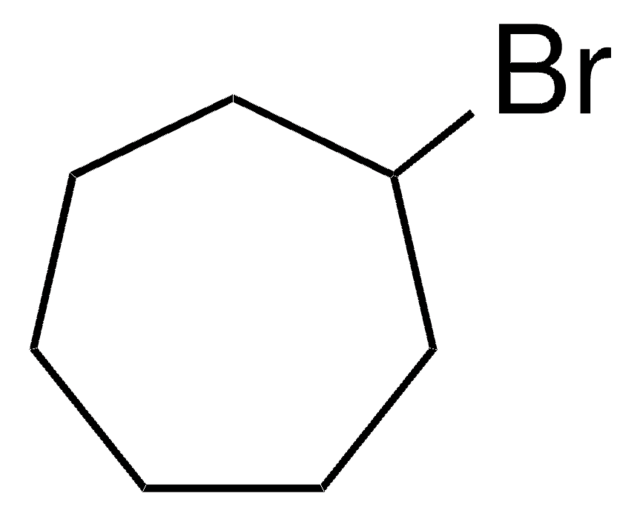141720
Cycloheptene
97%
Synonym(s):
(1Z)-Cycloheptene, cis-Cycloheptene
Sign Into View Organizational & Contract Pricing
All Photos(1)
About This Item
Empirical Formula (Hill Notation):
C7H12
CAS Number:
Molecular Weight:
96.17
Beilstein/REAXYS Number:
1900884
EC Number:
MDL number:
UNSPSC Code:
12352100
PubChem Substance ID:
NACRES:
NA.22
Recommended Products
assay
97%
refractive index
n20/D 1.458 (lit.)
bp
112-114.7 °C (lit.)
density
0.824 g/mL at 25 °C (lit.)
SMILES string
C1CCC=CCC1
InChI
1S/C7H12/c1-2-4-6-7-5-3-1/h1-2H,3-7H2
InChI key
ZXIJMRYMVAMXQP-UHFFFAOYSA-N
Looking for similar products? Visit Product Comparison Guide
General description
Kinetics of gas-phase reactions of cycloheptene with NO3 radicals and O3 has been investigated.
Application
Cycloheptene was used in one-pot synthesis of 1,2/3-triols from the allylichydroperoxides catalyzed by zeolite-confined osmium(0) nanoclusters.
Certificates of Analysis (COA)
Search for Certificates of Analysis (COA) by entering the products Lot/Batch Number. Lot and Batch Numbers can be found on a product’s label following the words ‘Lot’ or ‘Batch’.
Already Own This Product?
Find documentation for the products that you have recently purchased in the Document Library.
Customers Also Viewed
One-pot synthesis of 1, 2/3-triols from the allylic hydroperoxides catalyzed by zeolite-confined osmium (0) nanoclusters.
Goksu H, et al.
J. Mol. Catal. A: Chem., 378, 142-147 (2013)
Sherri A Mason et al.
The journal of physical chemistry. A, 113(19), 5649-5656 (2009-04-24)
Rate constants for the gas-phase reactions of NO(3) radicals and O(3) with a series of C(6)-C(14) 1-alkenes and 2-methyl-1-alkenes have been measured at 296 +/- 2 K and atmospheric pressure of air using relative rate methods. For the NO(3) radical
Alla Zelenyuk et al.
Faraday discussions, 200, 143-164 (2017-06-06)
When secondary organic aerosol (SOA) particles are formed by ozonolysis in the presence of gas-phase polycyclic aromatic hydrocarbons (PAHs), their formation and properties are significantly different from SOA particles formed without PAHs. For all SOA precursors and all PAHs, discussed
Jong-Ryul Park et al.
Biointerphases, 16(1), 011001-011001 (2021-01-07)
Poly(2-alkyl-2-oxazoline) (PAOx) hydrogels are tailorable synthetic materials with demonstrated biomedical applications, thanks to their excellent biocompatibility and tunable properties. However, their use as injectable hydrogels is challenging as it requires invasive surgical procedures to insert the formed hydrogel into the
Our team of scientists has experience in all areas of research including Life Science, Material Science, Chemical Synthesis, Chromatography, Analytical and many others.
Contact Technical Service













![9-Oxabicyclo[6.1.0]non-4-ene 95%](/deepweb/assets/sigmaaldrich/product/structures/328/338/c44d0a8d-81ab-4a17-81bb-aebb26a006e7/640/c44d0a8d-81ab-4a17-81bb-aebb26a006e7.png)
